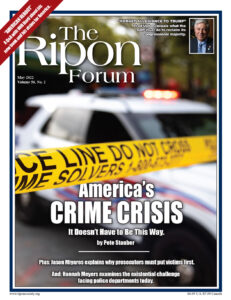Latest Ripon Forum Examines Rising Violence and the Need to Increase Public Safety in Our Country
With essays by Pete Stauber, Jason Miyares, Hannah Meyers & others
 WASHINGTON, DC — With over a dozen cities setting new homicide records in 2021 and more police officers killed in the line of duty than in any year since 1995, the latest edition of The Ripon Forum examines “America’s Crime Crisis” and the steps that should be taken to reduce violence and increase public safety in our country.
WASHINGTON, DC — With over a dozen cities setting new homicide records in 2021 and more police officers killed in the line of duty than in any year since 1995, the latest edition of The Ripon Forum examines “America’s Crime Crisis” and the steps that should be taken to reduce violence and increase public safety in our country.
Leading the Forum’s coverage of this issue is an essay by U.S. Rep. Pete Stauber (MN-8). Stauber spent over two decades as a police officer in his hometown of Duluth before his election to Congress in 2018. He is now a leader in the police reform effort on Capitol Hill. In his essay, he describes not only about the impact of crime on American families, but why he believes crime has been on the increase in recent years.
“The United States is suffering from a crime crisis,” Stauber writes. “Across our country, families fear for their safety when they hear stories of their neighbor’s falling victim to violent crime. And people are angry when they hear about criminals being released back into our communities due to woke district attorneys who refuse to press charges for criminal actions, leaving victims wondering why. Let’s be clear: this crime crisis and its devastation on the American people is a direct result of the Democrats’ obsession with the radical defund and disparage the police movement.
“Local politicians catering to radical activists rather than supporting law enforcement has dire consequences. The police profession has become not only undesirable, but more dangerous even for seasoned veteran officers who are just trying to keep their communities safe. Those with the noble desire to protect and serve are being forced into early retirement and recruiting into the profession has been difficult.”
Hannah Meyers of the Manhattan Institute examines some of these difficulties in an essay entitled, “The Existential Challenges Facing Police Departments Today.” The statistics she cites are alarming. “In New York City,” Meyers writes, “over 5,300 NYPD uniformed officers resigned or retired in 2020 — a 75% spike over the previous year … Seattle hemorrhaged 180 officers in 2020 and 170 in 2021 — a near doubling of the 95 officers who left in 2019. In Chicago, 660 cops retired in 2021, nearly twice as many as in 2018.”
Meyers shares her thoughts on the reasons for these difficulties and explores some of the positive steps police departments are taking to address them. These positive steps aside, she concludes that departments face an array of challenges ahead: “Police departments will need to convince recruits that being a cop is worth the increased dangers and will still be gratifying work even when offenders are cycled right back out to commit more crime. However, until criminal justice policies and political posturing shift, it’s going to be an uphill battle.”
In an essay that shines a light on some of these polices and posturing, Virginia Attorney General Jason Miyares writes about the important role that prosecutors play in ensuring public safety and why he believes too many are increasingly falling down on the job. “There are some locally elected prosecutors who are choosing not to prosecute groups of crimes,” Miyares writes, “selectively choosing pieces of the law to enforce and pieces to ignore. This warped version of criminal justice has created a public safety crisis … This ‘criminal first, victim last’ mindset only leads to more crime, more victims, and less safety for our families.”
In other essays examining America’s crime crisis, Clark Neily of the Cato Institute examines “The Disappearance of Trial By Jury” and the fact that over 98 percent of federal criminal convictions came from guilty pleas last year, while only two percent of cases went to trial. And Megan Stevenson, a professor at the University of Virginia’s School of Law, and Jeffrey Clayton, the Executive Director of the American Bail Coalition, look at America’s system of bail and the prospects – and peril – of reform.
Bryce Pardo and David Luckey of the Rand Corp. write about the drug crisis facing America and the growing threat of fentanyl. Brian Martinez of the American Conservation Coalition assesses a different kind of threat facing America – the threat of climate change – and why it is a threat that young Americans would like to see Republicans address.
In an interview, former Congressman and CIA officer Will Hurd discusses American Reboot, a book he has written about the broken system of politics in our country and his vision for change in the coming years.
And in our latest Ripon Profile, veteran lawmaker Fred Upton reveals who inspired him as a child and what the GOP must do to reclaim its congressional majority in 2022.
The Ripon Forum is published six times a year by The Ripon Society, a public policy organization that was founded in 1962 and takes its name from the town where the Republican Party was born in 1854 – Ripon, Wisconsin. One of the main goals of The Ripon Society is to promote the ideas and principles that have made America great and contributed to the GOP’s success. These ideas include keeping our nation secure, keeping taxes low and having a federal government that is smaller, smarter and more accountable to the people.
For more information on The Ripon Society, please visit www.clu.ccw.mybluehost.me.



